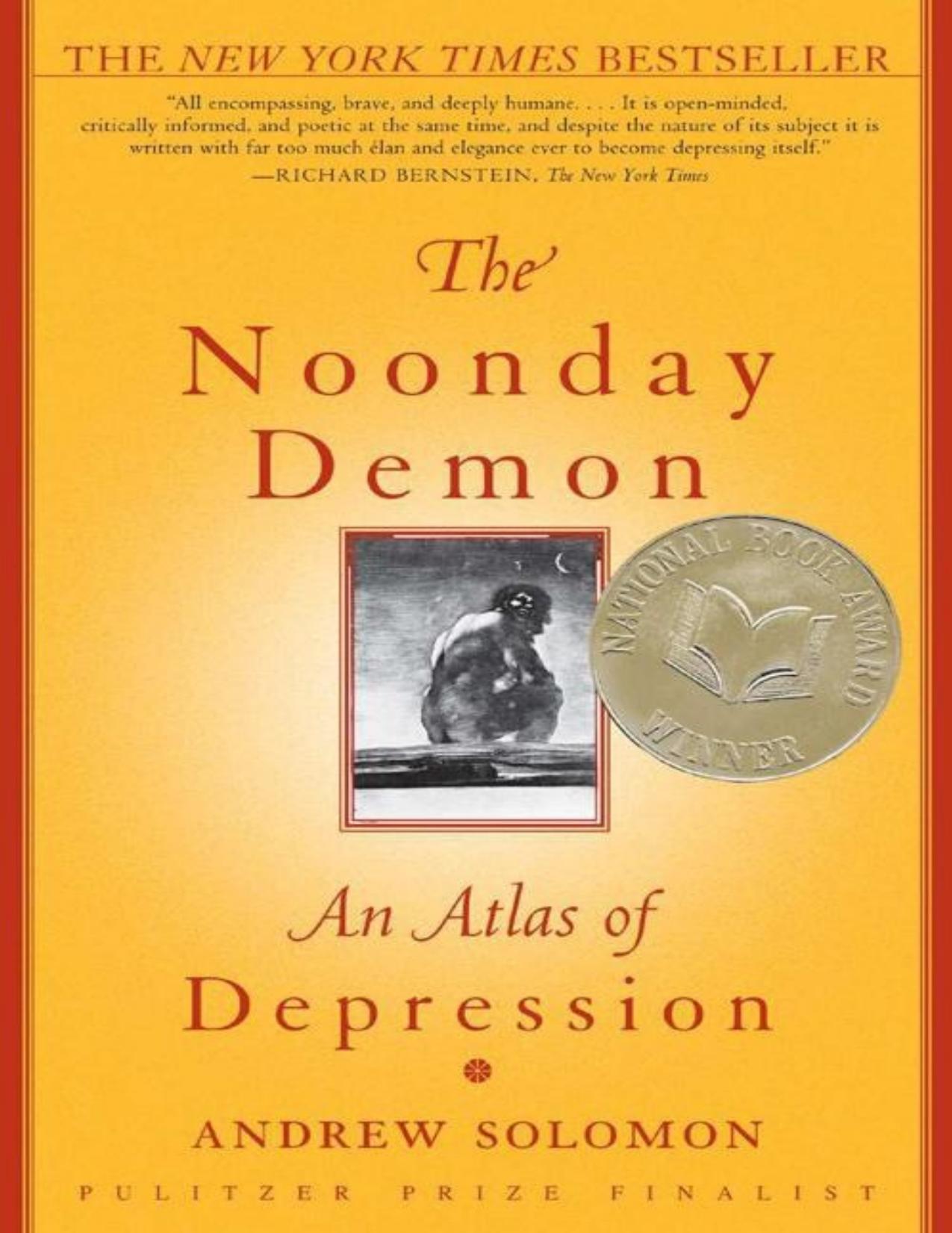The Noonday Demon by Solomon Andrew

Author:Solomon, Andrew [Solomon, Andrew]
Language: eng
Format: epub, pdf
Publisher: Simon & Schuster, Inc.
Published: 2011-11-15T22:00:00+00:00
. . . hail thou Goddess, sage and holy,
Hail, divinest Melancholy,
whose saintly visage is too bright
To hit the sense of human sight
until in a celebration of monastic isolation and gloom and old age, Milton waxes grand:
Find out the peaceful hermitage,
The hairy gown and mossy cell,
. . . . . . . . . . .
Till old experience do attain
To something like prophetic strain.
These pleasures, Melancholy, give,
And I with thee will choose to live.
The seventeenth century found history’s greatest champion of the melancholy cause. Robert Burton mixed a millennium of thought and a steady supply of scattered personal intuitions in The Anatomy of Melancholy, the volume to which he devoted his entire life. The most often-quoted book on the subject prior to Freud’s Mourning and Melancholia is a subtle, self-contradictory, badly organized, hugely wise volume that synthesizes and attempts to reconcile the philosophies of Aristotle and Ficino, the sense of character of Shakespeare, the medical insights of Hippocrates and Galen, the religious impulses of the medieval and Renaissance Church, and personal experiences of illness and introspection. Burton’s ability to locate real ties between philosophy and medicine, and between science and metaphysics, started us on the path to a unifying theory of mind and matter. And yet one cannot credit Burton so much with reconciling conflicting views as with tolerating their contradictions; he is quite capable of giving six discrepant explanations for a single phenomenon without ever suggesting that the phenomenon might be overdetermined. To the modern reader, this sometimes seems bizarre; but the same reader, examining texts recently issued by the National Institute of Mental Health, will find that the complexity of depressive complaints lies precisely in that they are usually overdetermined—that depression is the common destination to which many pathways lead, and that in any individual, a certain set of symptoms may be the result of one or any several of these pathways.
Burton comes up with a physical explanation for melancholy: “our body is like a Clocke, if one wheele be amisse, all the rest are disordered, the whole Fabricke suffers.” He acknowledges that “as the Philosophers make eight degrees of heat and cold: we may make 88 of Melancholy, as the parties affected are diversely seized with it, or have been plunged more or lesse into this infernall gulfe.” Later he says, “Proteus himself is not so diverse; you may as well make the Moon a new coat, as a true character of a melancholy man; as soon find the motion of a brin in the air as the heart of a melancholy man.” Burton makes a general distinction among brain-based “head melancholy,” “whole body melancholy,” and that which comes from the “Bowels, Liver, Spleene, or Membrane,” which he calls “windie melancholy.” These he then divides and subdivides, creating a map of distress.
Burton distinguishes melancholy from simply being “dull, sad, sowre, lumpish, ill disposed, solitary, any way moved, or displeased.” Such qualities, he says, are within the scope of any man alive and should not by themselves be taken as evidence of the complaint.
Download
This site does not store any files on its server. We only index and link to content provided by other sites. Please contact the content providers to delete copyright contents if any and email us, we'll remove relevant links or contents immediately.
The Art of Thinking Clearly by Rolf Dobelli(10458)
The 5 Love Languages: The Secret to Love That Lasts by Gary Chapman(9792)
Mindhunter: Inside the FBI's Elite Serial Crime Unit by John E. Douglas & Mark Olshaker(9324)
Becoming Supernatural by Dr. Joe Dispenza(8204)
Nudge - Improving Decisions about Health, Wealth, and Happiness by Thaler Sunstein(7694)
The Road Less Traveled by M. Scott Peck(7594)
Mastermind: How to Think Like Sherlock Holmes by Maria Konnikova(7324)
Enlightenment Now: The Case for Reason, Science, Humanism, and Progress by Steven Pinker(7306)
Win Bigly by Scott Adams(7184)
The Way of Zen by Alan W. Watts(6604)
Factfulness: Ten Reasons We're Wrong About the World – and Why Things Are Better Than You Think by Hans Rosling(4737)
The State of Affairs by Esther Perel(4712)
Gerald's Game by Stephen King(4642)
Man's Search for Meaning by Viktor Frankl(4586)
The Confidence Code by Katty Kay(4251)
Thinking in Bets by Annie Duke(4218)
The Healing Self by Deepak Chopra(3568)
Hidden Persuasion: 33 psychological influence techniques in advertising by Marc Andrews & Matthijs van Leeuwen & Rick van Baaren(3560)
The Worm at the Core by Sheldon Solomon(3486)
